
With #LadiesSupportingLadies as our mantra and this website as our platform, let's take time today to celebrate these amazing women and the impact that they all have had on our lives!

FELICITY SMOAK
(Arrow)
Mer: Felicity Smoak is the definition of inspiring. She has broken the mold of the stereotypical, trope-y female character on TV, especially the female character who then becomes the major love interest. Felicity is just a “normal” girl, the daughter of a single mother who worked her butt off to provide (and Donna Smoak deserves an entire blurb of her own for why she’s inspiring) — and also happens to be brilliant. She’s that every girl viewers can relate to: a little bit nerdy, a little bit awkward, but funny and sincere and real. Felicity uses her intelligence and her wit to demonstrate the true meaning of heroism — dedicating herself, and putting her life on the line to help the “superheroes” save the city.
Felicity Smoak is a woman in a man’s world, in more ways than one. First, as the IT girl, a field typically dominated by men. Then, as one third of the unstoppable Original Team Arrow. Felicity is not only the brains behind the brawn, but is a vital member of the trio. As now-CEO of Palmer Technologies, Felicity is once again proving that the glass ceiling can be shattered by commitment and smarts, and she’s doing things her way. She doesn’t let fear stop her, but she does experience it, and rather than fighting with her fists (though she occasionally does that, too, and is amazing the entire time) Felicity acknowledges her vulnerability and works through her emotions, and in the end reminds herself that she is strong, and unique, and important. She knows her worth, and she doesn’t shy away from embracing it. Felicity Smoak is a hero and an inspiration, and I’m grateful that I not get to watch her kick butt in a different way week after week, but that young girls and women have someone like her to look up to.
As Emily Bett Rickards, the brilliant actress behind Felicity, said about her character: “We [women] can all be strong, and we can do it in a hundred different ways. It’s a really important representation for women to know that they can be themselves. You don’t need to be the patriarchal definition of strong to be strong.”

REBECCA BUNCH
(Crazy Ex-Girlfriend)
Anne: The strength of Rebecca Bunch as a character and as an inspiring woman is only in part due to her attributes — her lawyering prowess, for example, or her support for her friends. But when I think of what inspires me, it’s so much less connected to how one yields her strengths and so much more connected to how she deals with her weaknesses. Rebecca is manipulative, self-loathing, immature, insecure — all traits which power the premise of Crazy Ex-Girlfriend and propel Rebecca to a litany of mistakes. These flaws only make her stronger to me, though. Not only is it inspiring to see a female antihero on television (and frankly outrageous that it happens so scarcely), it is inspiring to see a character being represented who struggles with herself despite desperately wanting to be better. Rebecca Bunch is inspiring because she’s relatable and imperfect. Her problems are not easily resolved, and people do not easily forgive her, nor does she easily forgive herself. The fact that she keeps trying, however, makes her a very strong female character — a survivor.
This is a fact that is not lost on the other characters, all of whom find themselves changed through knowing her, and it is not lost on me, either. I am so grateful for Rachel Bloom’s dedication to this show and her determination to represent flawed, complex, broken, beautiful women; her continued involvement in keeping Rebecca “a lot more nuanced” than a “crazy ex-girlfriend” is a blessing, and I am so happy that I can find inspiration in this show and this character, not because either represents perfection but because they represent how difficult, yet fulfilling, the everyday task of getting by can be.

HERMIONE GRANGER
(Harry Potter)
Jenn: Okay, what could I possibly say about Hermione Jean Granger that hasn’t been said? The truth is that when I was a kid, reading Harry Potter novels, I cared about Harry and his journey and I liked Ron, but I loved Hermione. This was a young, bookish witch who saved the world a thousand times over. Moreover, she saved HARRY a thousand times over. I love that Hermione was never presented as flawless in the novels, though. She wasn’t a perfect character and that’s what drew me to her so intimately. She excelled at her craft, cared deeply about those she befriended, and was someone who was always championing for goodness and light. She made it cool — heroic, even — to be a reader. And as a kid, reading about a heroine whose love of books was what saved her and her friends’ lives made me so happy.
Hermione’s goodness, her bossiness (because the boys were constantly getting themselves into trouble and would have been dead a LOT if not for her), and her sense of self-worth were what made her so relatable to me, and are still what make her relatable today.
(True story: Hermione is the real hero of the Harry Potter novels.)
Megan: I know I’m not the only one who identified with Hermione when they were younger. I was the same age as the holy trinity when the books started coming out. I was every bit as eager to please and learn as Hermione was. I always wanted to know more, to learn more, to know that it was okay for me to surpass the boys in school. Books were every bit as important to me as they were to her. But Hermione was so much more than her cleverness and her enthusiasm. She was soft and sweet, emotional and caring, a friend, a confidant, an ally.
At such a tender age, an age where you’re on the cusp of becoming a teenager, girls need that sort of character to let them know that you can be bossy, you can be smart, you can strive for being the best version of yourself and you can be happy about it. You don’t have to hide who you are or the size of your brain. The right people are going to love you for those qualities and remind you how great they are to have even when you sometimes don’t feel like they are. You never know what you’ll become if you hide. Hermione taught all of us to be proud of who we are and there’s nothing more important. Except saving the wizarding world from some seriously dark forces. But we’ll leave that to the brightest witch of our age.

SYNDEY BRISTOW
(Alias)
There is no one or right definition of strong. Strong can be emotional, it can be mental, it can be intellectual, it can be physical. Sydney Bristow embodied all of those and more, and she did so at a time when most women on TV weren’t allowed to. Being a woman means being strong in the way that makes sense for you, and Sydney Bristow inspired girls (like myself) to do just that.
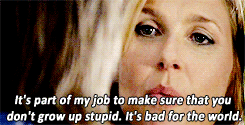
TAMI TAYLOR
(Friday Night Lights)
Megan: Friday Night Lights was full of some of the greatest characters on TV in the last decade. I mean, really — Coach Taylor, Tim Riggins, Buddy Garrity (a trip, but well written), Landry Clarke. I could go on and on. But the matriarch, Tami Taylor, was by far the best. She was a strong woman from the start. She stood by her husband no matter what and was protective over her daughter in all the right ways. She also never let anyone tell her no. When she wanted to get a job, she got a job. When she was met with problem after problem, she took them head on. Tami had a family, a job and a good head on her shoulders. She was nurturing and loving, strong and fierce, bold and brave. She was the definition of a well-rounded character that was written so beautifully. And Tami did all of this with some of the most incredible hair ever.

ANNALISE KEATING
(How to Get Away With Murder)
Jen W.: Annalise Keating is a mess. She’s juggling too many things at once — there are SO many lies on the dance floor, lots of cover-ups and murders. And yet somehow you still want to root for her to succeed. She’s not perfect, and what a liberating thing for a woman to be — unapologetically, too. Far too often the representation of women — particularly women of color — on TV has been one-dimensional. They are often not drawn in any real way to reflect the complexities of individuality or the things that make us particularly different. We are not all drawn the same way. Stick us in the same situation, and more than likely, we will react differently. And that’s what’s so great about Annalise. Just when you think she’s out of options, she’s really been at least five to ten steps ahead of everyone else. A lot of it is self-preservation as well as a deep sense of needing to be in control. Annalise is flawed, and I welcome that. We don’t get to see complex women on TV often, and she really turns the “strong woman” ideal on its head. Strong doesn’t just mean one thing.
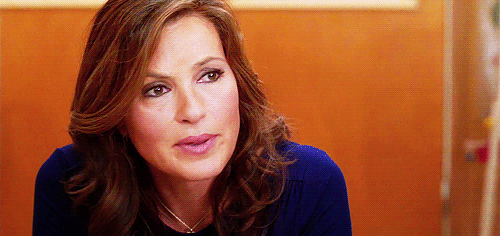
OLIVIA BENSON
(Law & Order: SVU)
Alisa: If I name my first child Olivia, it’ll be because there are some incredibly strong and beautiful television characters named Olivia who have influenced my life. Olivia Benson is a character that I grew up watching. She has been part of Law & Order: SVU since the very first episode, and continues to be the main character now, 17 years later. This show and this character have existed for over half my life. Olivia has dedicated her life to helping women (and men) who are victims of sexual assault. She has worked her way up through the ranks from detective to sergeant. She navigates archaic views, complicated laws, lawyers and district attorneys to get justice for the victims she encounters. She had a complicated and difficult childhood, is a survivor of sexual assault herself, and is a mother.
In a world where women continue to face horrific ordeals, to be mistreated, assaulted, and abused, Olivia Benson gives me hope. In fact, she gives the world hope. Research that came out a couple years ago showed that individuals who watch Law & Order: SVU have greater empathy for women who have been victims of assault. Because of issues brought to light by this show, cities around the country began making concerted efforts to catch up on their backlog of rape kits that need testing. Real change has occurred because of this show, and because of the character Olivia Benson. I can’t think of a better character to be inspired by than one who has exacted real change in the real world.

ANNIE EDISON
(Community)
Jenn: I’ve talked a lot about Annie over the years. My favorite character on Community by a long shot, this is a young woman whose idealism and brightness were products of the difficulties she had to face. Annie was an addict in high school and voluntarily checked herself into rehab, against the wishes of her parents. She was cut off from her family, worked hard to put herself through school, and maintained flawless grades as a result. The reason that I have always loved Annie and why she impacts me so deeply as a character is because she’s a shining example that goodness and hope don’t have to be manufactured in easy circumstances — this is a character who did not let her darkness make her bitter or jaded or cynical. Instead, her difficulties made her even more hopeful. Annie always believed in friendship and loyalty, and the admirable thing is that she always fought for those ideals — even when she was the only one fighting. I love Annie, and I always will.

SPECIAL AGENT DANA SCULLY
(The X-Files)
Alice: Growing up, I had two major television heroes: April O’Neil and Special Agent Dana Scully. The former was a TV reporter who rocked a yellow jumpsuit and got to hang out with giant turtles all day while eating pizza. The latter was an incredible doctor, investigator, scientist, and partner. For eight seasons, I watched Scully take down the bad guys, debunk myths, and fight to make the world better — safer. As her worldview slowly expanded, so did my own. Scully could be wrong without being dumb, and hesitant without being fearful. She fought alongside her partner (and yeah, it helped that he was a fox) but Mulder never fought her battles for her. In fact, Scully was often the one protecting herself. Using her wit, intelligence and gun, she did her job, and was really good at it. The revival of The X-Files might not have been all we had hoped for, but it did prove one thing: no matter how much time passes, Scully will still be the best and brightest in the room, cracking chests and taking names.
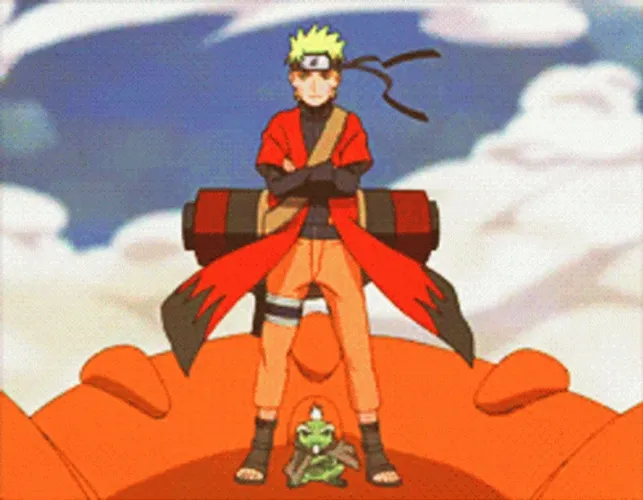
LIZ LEMON
(30 Rock)
Megan: As I grew up, Liz Lemon was so representative of me it was almost scary. She was never afraid to be funny and never afraid to put her emotions on the line. Lemon would always let you know how she felt and she went up against Jack Donaghy with some incredible one-liners. She was vulnerable and stressed out and kind of a mess, and that was what made her so great! It’s refreshing sometimes to see women just be total messes on TV because that’s realistic. Sometimes we don’t have it all together and sometimes we go a little crazy from the stress of it all. That leads to a lot of pizza and a lot of donuts... and okay, a lot of binge-eating in pajamas while we watch TV. It happens, and it was so nice and empowering for that to be represented in 30 Rock. Liz Lemon proved that we don’t have to be on all the time. We can be a little messy and allow ourselves to revel in our sarcasm. Because we all have a little Liz Lemon in us.
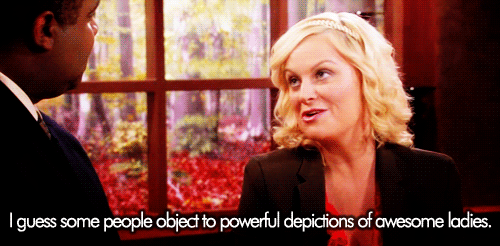
LESLIE KNOPE
(Parks and Recreation)
Jenn: Leslie Knope is the epitome of a strong woman. She is kind and compassionate, fearless and fiercely loyal, and puts her entire heart into all that she does. If we all did our work on a daily basis with the kind of dedication and purpose that Leslie did, the world would be a far better place. Leslie’s biggest strength is that she cares. Literally, and in all circumstances, she CARES. There is no cause too small for her, nor too big. She’s the best friend someone could have as she is both a compassionate listener and a great advice-giver. Leslie Knope is a woman I admire, and that might sound weird because she’s a fictional character. But really, everything that she stands for and all that she is just begs me to be inspired by her.

REY
(Star Wars: The Force Awakens)
Melanie: Ironically — and unfortunately — the biggest influence for me as a young lass wasn’t the presence of a character, but lack thereof. I’ve been a huge Star Wars nerd since I was seven or eight, and watched them over three nights with my parents before the prequels made everyone’s eyes bleed. And my oldest friend will tell you he and I spent years beating each other up with lightsabers in the backyard, comparing Star Wars toys, and watching the movies. And even though I surrounded myself with people who didn’t care for the codified gender norms when it came to who should like Star Wars, it has always been a boys club. So I ached for a female character I could proudly claim on the playground or eventually write about in thinkpieces on the Internet. Leia and Padme are fierce, unquestioned leaders and imperative to the plot, but everyone knows the true heroes of Star Wars are the Jedi. And while some secondary media have portrayed female Jedi as main characters, I wanted the world to see one in action on the big screen. An in December 2015, I finally got my wish.
Rey is everything I needed to see in a female main character in the saga. She’s a loner but she wants friends, she’s not helpless but not above receiving help, she’s terrified and incredibly brave, she’s often right but makes mistakes, she’s forged strong by the desert but not afraid to cry. She’s not a “strong female character” — she’s a character who happens to be a woman and is rounded and buffed at nearly every facet of her personality. She’s not perfect but she can hold her own, she gets rescued and in the end does some rescuing herself. And she finally gets to join the pantheon alongside Luke and Vader as characters who have taken steps into the Star Wars hero’s journey. Getting to see a woman placed in a narrative structure historically and culturally reserved for men in the biggest film franchise of all time is beyond exciting. I just about got down on my knees and wept for joy when she fought Kylo Ren for Luke’s lightsaber and won: the legacy of Star Wars is now in the hands of a woman, literally.
Now being 24 years old won’t stop me from dressing up as her for Halloween, but I’m incredibly excited for all the lady younglings out there to brandish lightsabers with pride. After years of being told “you know that’s a boy’s costume right?” little girls, teenage girls, and me, the young adult who pays taxes, can say the word Jedi and hero belongs to us too. So Happy InterGALACTIC Women’s Day Rey!
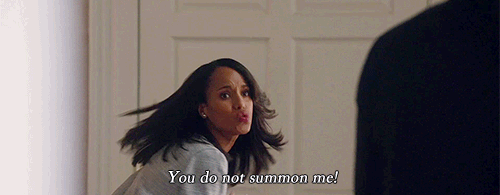
OLIVIA POPE
(Scandal)
Alisa: I discovered Scandal a few months after my divorce. It was summer, the first couple seasons were on Netflix, and I thought, why not? It didn’t take long for me to be hooked. I’m not usually a fan of political dramas, but it wasn’t the politics that hooked me — it was Olivia Pope. She was strong and intelligent and oh-so damaged. Television can serve as a beautiful escape from real-world problems, which is all I was looking for when I started watching Scandal. I had just emerged, bruised and broken, from an incredibly unhealthy relationship and here, unfolding on-screen, Olivia was navigating a terribly unhealthy relationship of her own. I related on a visceral level to many of the things she was going through — to her thought processes, to her actions. Scandal and Olivia did not provide the escape I’d been looking for, because creator Shonda Rhimes is not about escape. Shonda is about waking you up. She is about making you face your fears and confront your demons. She is about moving ever-forward even when it feels like you can’t take one more step. Olivia was strong and determined in ways that I longed to be.
And from watching her that first summer, and throughout the seasons going forward, I learned so much more about myself. I learned that strength is not always easily defined; that not feeling strong is not the same as not being strong. I learned that you can be strong and brave and good, but still make mistakes. Olivia struggles in every episode with the mistakes she’s made and whether to let them define her. She does not always make good choices. She does not always feel strong. But she does the best she can. And at the end of the day, that’s all any of us can do.

IRIS WEST
(The Flash)
Jen W.: I’ve been a fan of Iris West since season one of The Flash, and this season we’re finally seeing that Iris West is a force to be reckoned with. She’s smart, she’s capable, forward-thinking, decisive, loving, and protective. She wants so much for Barry to be the hero she knows he can be and does so without ever diminishing herself or her own capabilities. She’s not a part of the S.T.A.R. Labs team, but there’s immense value in that because she can often see the bigger picture where as the team can be very insular. Earth-2 Iris West even kicks major butt! Iris West in any universe is dynamic and bold. Whether she’s standing behind a gun, or sitting down at her computer. She’s also tender-hearted. She lost her fiancé, but she didn’t stop caring deeply about people, and didn’t shut herself off from what could happen if she tried again. That takes an incredible amount of strength and courage — the kind that’s perhaps underrated in this universe because she’s not on the front line the same way others are. She always knows just what to say to Barry and is his biggest cheerleader. She’s proven time and again how wholly capable she is while not being a “superhero.” That’s pretty incredible if you ask me.
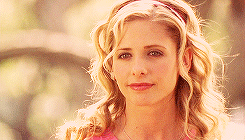
BUFFY SUMMERS
(Buffy the Vampire Slayer)
Jen K.: My Twitter handle is jbuffyangel, so it’s almost criminal not to write about Buffy Summers on Women’s Day. I was just a teenager when Buffy The Vampire Slayer was on the air, but there’s never been a television character that captivated me like Buffy. She was beautiful, strong and funny, but what I loved most about her was how human she was. Buffy made mistakes. She was imperfect. It was often her mistakes and imperfection that taught her the most about life. Buffy would use those lessons to make her a stronger fighter and a better person. She was also someone who knew how to ask for help and lean on others. That never made her any less of a hero. It’s something I kept in mind as I grew older. So often being a “strong woman” is about being perfect and doing everything on your own. I realized as a woman I don’t have to “do it all.” It’s okay to make mistakes. It’s okay to ask for help. It doesn’t make me any less strong. Despite her superhero powers, Buffy is a spectacular example of a real woman.
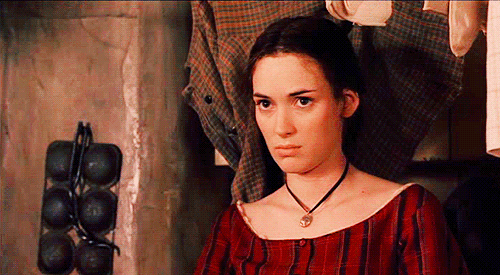
JO MARCH
(Little Women)
Mer: Jo March is my original inspirational woman. Little Women is and has always been my favorite book. I have read multiple different versions at least 30 times by this point, and I have read the sequels as well. Jo March represented everything I aspired to be as a young girl, and many things I felt I already was. She loved to read, was witty and sarcastic, whip-smart, and unapologetically independent. Add to all that the fact that she was living in Colonial times, when being all those things and a woman was... well, not encouraged, to say the least. Jo wanted to learn and know things and read and create. She wanted to explore and travel and meet people. She was overly curious and didn’t abide by anyone else’s rules. She was also fiercely loyal and protective of her sisters. It shouldn’t surprise anyone who knows me that this is a fictional woman I relate to. Jo March didn’t just defy societal-gendered expectations; she scoffed in the face of them. To me, she was the original embodiment of “smart is sexy.”
In a time when women were expected and groomed to be pretty, to be seen and not heard, to fulfill only certain roles, Jo March took all that, shook it up, and said "screw it." Wit and intelligence and knowledge and humor are power, and Jo March taught me that. Jo has long been a personal inspiration for me, someone I hope to emulate, and today I honor her on a larger scale, and I hope that generations of young women to come can take inspiration and hope and guidance from her, too.

CARRIE BRADSHAW
(Sex and the City)
Megan: It’s been my dream since I even knew it was a career to be a writer. I could tell stories (for a living!) and reach people and tap into emotions just with a few words. When I started watching Sex and the City (at probably the wrong age), I gravitated toward Carrie, despite being a Miranda. Carrie was everything I wanted to be. She was a writer living in New York City and had one of the most amazing closets on a seriously strict budget. And she loved hard. She not only loved the male suitors in her life strongly, but held onto her friends even more. She never stopped being who she was and who she wanted to be. She was a writer, a friend, a reader, a thinker and she loved so hard. It was inspiring.

JANE VILLANUEVA
(Jane the Virgin)
Jen W.: I quickly fell in love with Jane The Virgin during the pilot which is incredibly rare for me, and I completely and totally credit that to the wonder that is Jane Villanueva. She’s a romantic, a writer, and vows not to have sex until she gets married. It would be simple to take this show and make it ridiculous, but Jane is so compelling. She’s forthright and honest. She’s got a spine of steel, but is so deeply compassionate. She makes mistakes, has a tender heart, is so very smart, and painfully unworldly. Jane, her mother Xiomara, and her grandmother Alba make up the trinity of women on this show that make me need to know what’s going to happen next. It’s the strength of Gina Rodriguez’s acting, the realness of the writing, and the heart of this character that makes Jane a woman I want to be friends with in real life. There are real struggles and problems, and fantastical struggles and problems, but they’re all grounded in the reality of Jane drawing us into her story, being fully actualized and not losing that head-in-the-clouds romanticism that makes her one in a million.
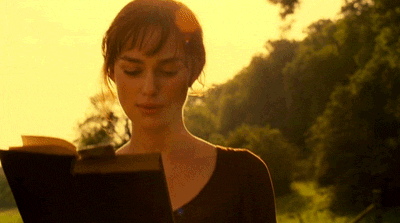
ELIZABETH BENNET
(Pride and Prejudice)
Who are some women who have inspired you? Let us know in the comments or by tweeting us. And don't forget to celebrate International Women's Day on Twitter using the hashtags #InternationalWomensDay and #IWD2016!




0 comments:
Post a Comment